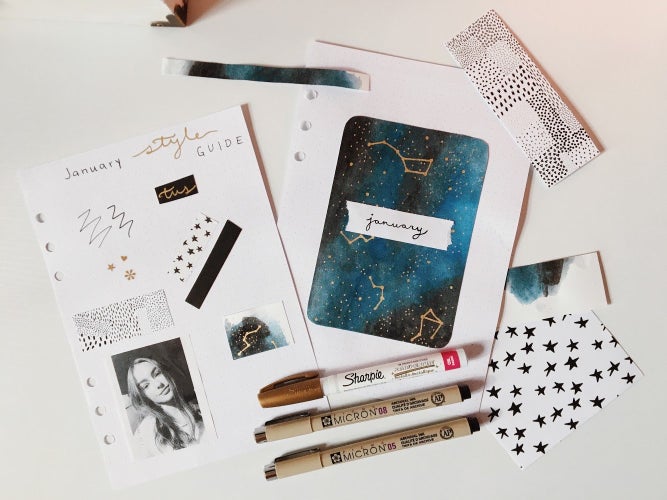This past year has seen the rise and fall of self-care trends, many of which have proven to be unfulfilling or simply a waste of time. There are a few gems among the many practices out there that really improve your overall quality of life, but finding them requires trying them all. At a time in my life when I was looking to start a new project, I created a dream journal. 12 months later, I can successfully share my experience.
After I picked out a cute journal, I was ready to begin. In my journal, I documented any dreams I had over the course of the night as soon as I got up in the morning. I simply jotted down every detail I could remember from my dream, including where I was, who was there, and a scene-by-scene breakdown of what took place. Most importantly, I wrote down exactly how I felt during the dream.
If I had multiple dreams in one night, I made sure to document all of them under that day’s heading. In the morning, if I didn’t remember dreaming at all, I would simply skip that day and follow up after the next night. Below are my key takeaways from the experience.
1) It started my day with structure.
Because dream journaling requires you to write first thing in the morning, it provided an invaluable structure to my daily routine. I would write down my dreams with the sense of urgency it entails—if you don’t get your pen and paper soon enough, it may slip from your memory forever! That being said, starting my day off at my journal jump-started my day and helped me stay productive and motivated. This advice is reflected in US Navy Admiral’s bestselling book, Make Your Bed, where William McRaven recommends that you begin every day by making your bed to create a sense of accomplishment along with a plethora of other benefits.
Instead of going straight to my phone when I woke up, I reached for my journal instead. If I had dreamt three nights in a row, I couldn’t risk losing that streak by forgetting to write it down. Dream journaling as an added component to my daily routine gave me the perfect amount of structure I needed to begin and maintain productivity.
2) I was able to understand myself better.
Rereading an entry or perusing my journal months later often posed many questions for me. I found myself wondering, how does this dream represent my mental state, or how does it symbolize where I am in my life right now? How can I glean instruction from this dream in my real life?
After a few months, I began to notice patterns in my dreams: themes of vulnerability, feelings of instability, and less serious ones, like repeated celebrity appearances in my family home. There are plenty of dream analysis methods to explore if it piques your interest, such as The Dream Encyclopedia by James Lewis, which is a great resource for interpreting your dreams. Although extracting a deeper meaning from your dreams can add an interesting layer to dream journaling, it is by no means a requirement!
3) Dream journaling is feasible.
Dream journaling is among the lowest maintenance of self-care practices. It takes no more than ten minutes out of your day, which is completely worth the rewards you reap in the long run. Plus, it requires little material: a pen and a notebook are all you need.
Dream journaling can serve as an alternative (or supplement) to standard journaling practices, where you might document your day and work through your feelings or hardships. Many people, including myself, tend to procrastinate writing in their daily journals, feeling intimidated by the self-reflection it demands. Meanwhile, dream journaling allows you to work through those feelings subconsciously, and all you have to do is recall what you dreamt of the night prior.

In addition to the meditative nature of writing down your dreams, decorating the journal offers a creative outlet without the high stakes. Personally, I decorated my journal with stickers I collected over the years, creating a scrapbook-style feeling to the pages. Go full-on Dickinsonian with your dream journal if your heart desires, by pressing flowers between the pages, sketching its characters between the sentences, or even pasting relevant memes.
4) Reading your dreams is entertaining!
As the weeks went by, I collected a wide range of dreams—some nightmares, a few heart-wrenching ones, but loads of hilarious stories. Our dreams are random and mostly unexplainable; there’s no way of knowing why your brain brought your dog, your third-grade teacher, and an admonishing Squidward in one room to scold you for missing an imaginary assignment on Canvas, but it did. So, might as well jot it all down for a good laugh at a later date.
5) Everyone can take their own approach!
I’ve learned that there is no single, correct way to approach dream journaling, and that is precisely what I love about it. This method of self-care allows for a multitude of different avenues for everyone to explore, whether it be simply adding an activity to ease some boredom in your day, seeking a method of meditation, or creating a book of stories, everyone can find their own reason to dream journal.
For me, my purposes for journaling changed over the past year as I was writing down my dreams, and I found that it’s what allowed me to keep at it. There were times when I kept it entirely to myself and others when I made dream journaling a social event where my friends and I shared our funniest dreams and came together to analyze memorable ones.





